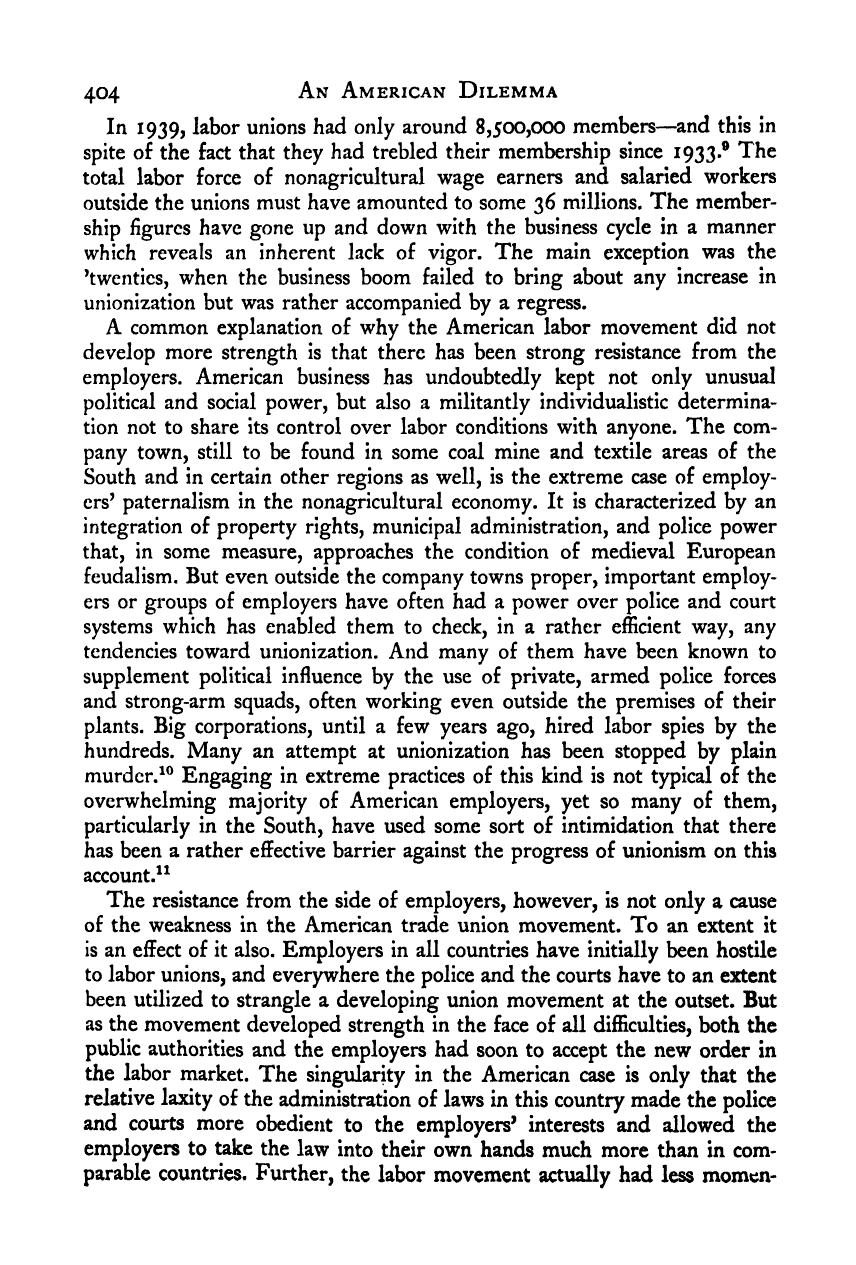Note: Gunnar Myrdal died in 1987, less than 70 years ago. Therefore, this work is protected by copyright, restricting your legal rights to reproduce it. However, you are welcome to view it on screen, as you do now. Read more about copyright.
Full resolution (TIFF) - On this page / på denna sida - IV. Economics - 18. Pre-War Labor Market Controls and Their Consequences for the Negro - 4. A Weak Movement Getting Strong Powers

<< prev. page << föreg. sida << >> nästa sida >> next page >>
Below is the raw OCR text
from the above scanned image.
Do you see an error? Proofread the page now!
Här nedan syns maskintolkade texten från faksimilbilden ovan.
Ser du något fel? Korrekturläs sidan nu!
This page has never been proofread. / Denna sida har aldrig korrekturlästs.
404 An American Dilemma
In 1939, labor unions had only around 8,500,000 members—and this in
spite of the fact that they had trebled their membership since 1933.® The
total labor force of nonagricultural wage earners and salaried workers
outside the unions must have amounted to some 36 millions. The member-
ship figures have gone up and down with the business cycle in a manner
which reveals an inherent lack of vigor. The main exception was the
’twenties, when the business boom failed to bring about any increase in
unionization but was rather accompanied by a regress.
A common explanation of why the American labor movement did not
develop more strength is that there has been strong resistance from the
employers. American business has undoubtedly kept not only unusual
political and social power, but also a militantly individualistic determina-
tion not to share its control over labor conditions with anyone. The com-
pany town, still to be found in some coal mine and textile areas of the
South and in certain other regions as well, is the extreme case of employ-
ers’ paternalism in the nonagricultural economy. It is characterized by an
integration of property rights, municipal administration, and police power
that, in some measure, approaches the condition of medieval European
feudalism. But even outside the company towns proper, important employ-
ers or groups of employers have often had a power over police and court
systems which has enabled them to check, in a rather efficient way, any
tendencies toward unionization. And many of them have been known to
supplement political influence by the use of private, armed police forces
and strong-arm squads, often working even outside the premises of their
plants. Big corporations, until a few years ago, hired labor spies by the
hundreds. Many an attempt at unionization has been stopped by plain
murdcr.^^ Engaging in extreme practices of this kind is not typical of the
overwhelming majority of American employers, yet so many of them,
particularly in the South, have used some sort of intimidation that there
has been a rather effective barrier against the progress of unionism on this
account.^^
The resistance from the side of employers, however, is not only a cause
of the weakness in the American trade union movement. To an extent it
is an effect of it also. Employers in all countries have initially been hostile
to labor unions, and everywhere the police and the courts have to an extent
been utilized to strangle a developing union movement at the outset. But
as the movement developed strength in the face of all difficulties, both the
public authorities and the employers had soon to accept the new order in
the labor market. The singularity in the American case is only that the
relative laxity of the administration of laws in this country made the police
and courts more obedient to the employers’ interests and allowed the
employers to take the law into their own hands much more than in com-
parable countries. Further, the labor movement actually had less momen-
<< prev. page << föreg. sida << >> nästa sida >> next page >>